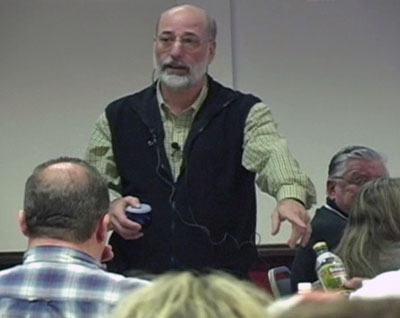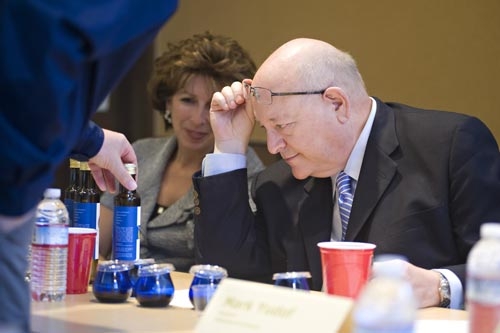Posts Tagged: oil olives
Florida citrus growers explore olive opportunities
Citrus growers in Florida, who are struggling with the devastating citrus disease huanglongbing, are considering growing olives, according to a report on the Tampa, Fla., ABC news affiliate.
Reporter Ryan Raiche covered a meeting at the University of Florida Citrus Research and Extension Center where UC Cooperative Extension farm advisor Paul Vossen introduced growers to olive production and marketing and offered citrus growers the opportunity to taste a variety of olives and olive oils.
“This is not a slam dunk, because this is a really peculiar crop that needs really specific things in order to flower and fruit,” Vossen said.
Olives thrive in a dry climate where it’s not too hot and not too cold. Vossen said rain during bloom season could wipe out the crop.
Ojai man appointed to Regional Water Quality Control Board
Ventura County Star
Gov. Jerry Brown has appointed Ventura County UC Cooperative Extension director emeritus Larry Yee to the Los Angeles Regional Water Quality Control Board.
The board oversees water quality issues and has the power to fine polluters.
Yee worked for the UC Cooperative Extension from 1975 to 2008 and was the Ventura County director from 1986 to 2008. He also was director of the UC Hansen Trust, which was set up to promote agricultural research and education.
USDA's new olive oil standards take effect Monday
The USDA's new voluntary guidelines defining "extra virgin" olive oil go into effect Monday, but many of California's producers are already following even stricter regulations set down by the California Olive Oil Council, according to an article in the Ventura County Star.
USDA's guidelines allow for no defects and no more than 0.8 percent free oelic acid in olive oil labeled "extra virgin;" COOC requires no defects and no more than 0.5 percent free oleic acid.
The new guidelines come on the heels of a UC Davis Olive Center study finding that of 52 bottles of 19 brands of extra virgin olive oils sampled, 32 failed to make the extra virgin cut as described in the new guidelines. The study focused on imported brands, but included two samples each of five California brands. Of the 10 California samples, one failed the extra virgin test.
Even though they are voluntary and there is uncertainty over how or even whether they will be enforced, executive director of the UC Davis Olive Center Dan Flynn welcomes the new national guidelines.
“This is an important first step, because the current guidelines date back to 1948 and are irrelevant to the way olive oil is marketed today," Flynn was quoted in the story. "Instead of ‘virgin’ and ‘extra virgin,’ they use terms like ‘Grade A Fancy,’ as though you were talking about cans of fruit cocktail. It’s a consumer-protection issue."

Olive oil.
President's Blend: Yudof chooses olive oil
Signed, sealed and soon to be delivered: University of California President Mark Yudof’s own blend of olive oil.
UC Davis already has its own popular olive oil, sold in the campus bookstore and online, with customers including Yudof. The self-supporting UC Davis Olive Center – the only academic center of its kind in North America – is looking to branch out with the UC-wide President’s Blend.
A day before Yudof began his tour of high schools to promote access to a UC education, he visited the UC Davis Olive Center on Sept. 30 to give his official seal of approval to the President’s Blend olive oil.
Accompanied by UC Davis Chancellor Linda Katehi and leaders of the campus’ Robert Mondavi Institute for Wine and Food Science, Yudof chose from five blends made with olives grown in California. His favorite? A blend 25 percent Frantoio (Italian) olives and the rest Arbequina (Spanish) olives, the most commonly planted olive in California. Nutty? Yes. Pungent? Check. Bitter? No. Yudof also chose a label design with an image of olives, the UC seal in the middle and the words “President’s Blend.”
“I’m really humbled,” said Yudof, who plans to buy bottles of his blend to send to relatives.
The President’s Blend is expected to be available by the winter holidays. The plan is to sell it at all UC campus bookstores in quarter-liter bottles for $12 apiece.
“We’re hoping we can get out to the other campuses and expose them to really good olive oil,” said Dan Flynn, executive director of the UC Davis Olive Center.
In July, the Olive Center garnered international attention with its study that found many imported olive oils sold in California are not “extra virgin” as their premium labels claim they are. The center is doing a second study to confirm the results, UC Davis professor and sensory scientist Jean-Xavier Guinard said.
The center, part of the Robert Mondavi Institute, collaborates across campus and among producers and the community to promote olive and olive oil research and education. Before testing the olive oil blends, Yudof visited a mobile olive mill, enclosed in a custom-built 38-foot trailer. Olive to Bottle owner Thom Curry brought it for the center’s sold-out course for olive oil producers. “It’s basically like making fruit juice,” Curry said. “The fresher, the better with olive oil.”
Yudof, who also toured the Robert Mondavi Institute’s newly completed, environmentally cutting-edge winery, brewery and food-processing complex, noted the economic promise of California’s growing olive oil industry. California produces almost all olive oil made in the United States, although that amounts to just 1 percent of total domestic consumption in the import-dominated market.
“The olives have the potential to be one of the leading crops in the state, with UC Davis being a leader in the industry, just like with wine and almonds,” Yudof said.
Read more and view a slideshow at Dateline UC Davis.
Olive Oil Times touts UC Davis Olive Center
An industry blog on the website Olive Oil Times devoted a lengthy post to the UC Davis Olive Center this week. The center, established two years ago, is part of the Robert Mondavi Institute for Wine and Food Science.
In the post, writer Sophia Markoulakis noted that acreage of California olive trees for oil has increased from 6,000 in 2004 to 22,000 in 2009.
"And with California producing 99 percent of the nation’s olive oil, the UC Davis Olive Center is ground zero for ongoing olive industry research and outreach," Markoulakis wrote.
The post included comments from the center's executive director Dan Flynn, who told the writer he is pleased with consumers’ growing enthusiasm for olive oil and growers' dedication.“Being out there with those in the industry to find out their needs and how the university can help better serve them is a unique position that the Olive Center is in," Flynn was quoted. "We are the conduit between the university and the industry."
In the future, Flynn plans to develop a collaboration between table olive and oil olive growers.
“Up until now they have operated separately and I think they realize that they have to work together. They are both facing overseas competition”, the post quoted Flynn.

Dan Flynn
California farmers produce superior olive oil
California olive oil may cost a little more than the mass-produced imports commonly found at the supermarket, but UC farm advisor Paul Vossen said it is well worth the money.
“Good olive oil imparts delicious, subtle flavors to foods, its antioxidants can neutralize free radicals in the body and it is ‘greener’ than other vegetable oils because it requires no heat or chemical extraction," says Vossen, who has traveled the world to study olive oil production.
Most of the imported oils found at the store, he says, have been sitting too long, are rancid or fermented. Even the assertion on a bottle of olive oil that it is “extra virgin” means very little. There is no U.S. law that enforces an “extra virgin” standard. Almost all California olive oil, however, is fresher and better-tasting and the number of farmers producing the local oil is increasing.
A recent UC Davis survey determined that 12,127 acres of super-high-density olive trees were planted in California as of the end of 2008, with 78 percent of the acreage planted between 2005 and 2008.
"The super-high-density olive sector has achieved impressive growth in just a decade," said Dan Flynn, executive director of the UC Davis Olive Center. "This survey, the first conducted exclusively of this sector of the state's olive industry, highlights grower practices and suggests areas in which the University of California might be able to provide assistance."
In addition, consumer education is important to raise awareness about the superiority of California olive oil. Vossen believes the key to boosting sales of the local product is to get people to taste it. “They need to know how fantastic it really is,” he said.
In the video below, Vossen conducts an olive oil tasting session:
More about California olive oil is available in the article California olive oil is worth the splurge. Vossen's Web site contains extensive information about olive oil courses, PowerPoint presentations and publications.


